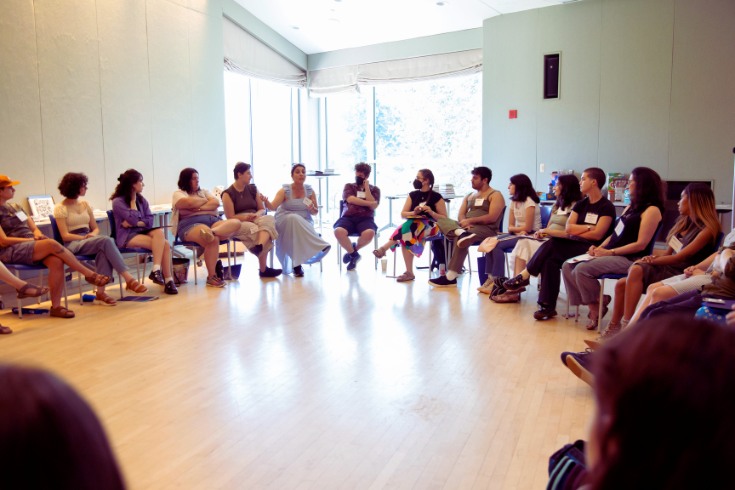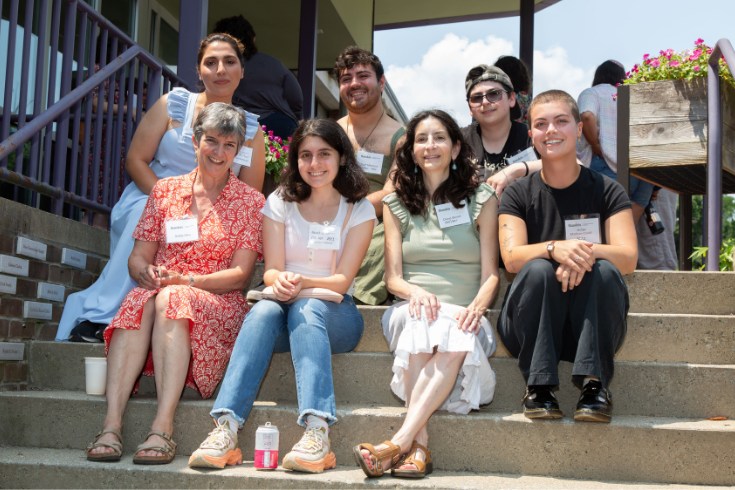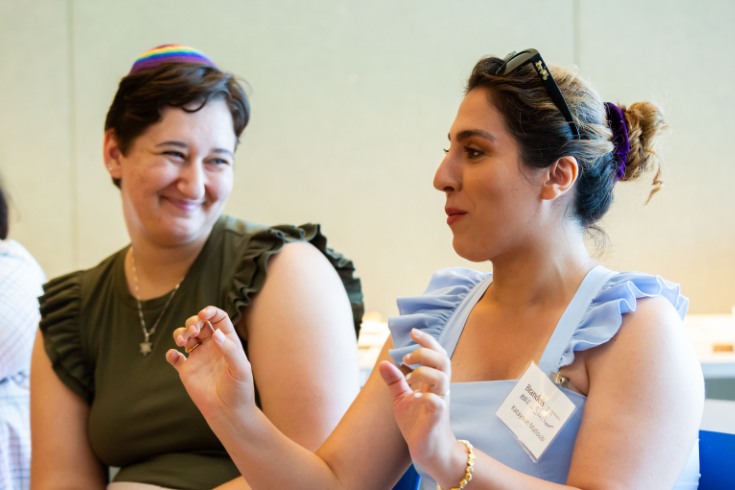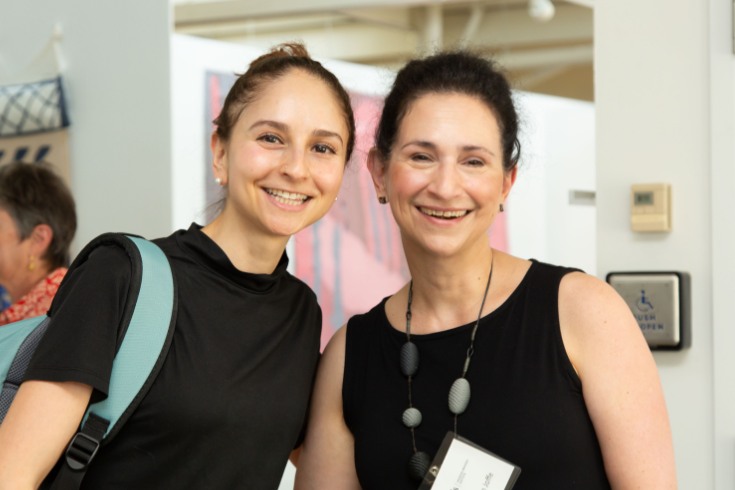HBI Reunites Summer Interns
By Amy Powell
 During this summer’s Gilda Slifka HBI Summer Internship, HBI hosted a reunion of all 26 years of the program, bringing together a group of interns that included Jewish communal professionals, Jewish studies academics, public policy advocates, and many others.
During this summer’s Gilda Slifka HBI Summer Internship, HBI hosted a reunion of all 26 years of the program, bringing together a group of interns that included Jewish communal professionals, Jewish studies academics, public policy advocates, and many others.
A highlight of the day was hearing about the formative role the internship played in developing and using important skills through all the next steps of their personal and professional lives.
“HBI is the central piece that pulled together all my experiences,” said Ben Steiner, PhD a 2013 HBI Summer Intern and a professor of Jewish Studies at Trinity College, noting he learned that Jewish Gender Studies is a “wildly interdisciplinary field” where he could bring together all his interests, in Judaics, law, history; and that he could stay connected to an important network.
About the Program
The Gilda Slifka HBI Summer Internship has three components; working for a faculty mentor as a research assistant, participating in a seminar on Jewish women’s and gender studies and hearing from guest lecturers doing exciting work in all sorts of disciplines, and doing a personal research or creative project.
“Interns come to HBI for many reasons: to conduct research that will form the basis for an academic project, like an honors paper, or chapter in a thesis or dissertation, to pursue creative projects or learn about Jewish gender studies in ways not available at their home universities, and to deepen their understanding of their own identity,” said Lisa Fishbayn Joffe, SJD, the Shulamit Reinharz Director of HBI.
 The reunion included a roundtable discussion about ways the internship informed their professions, breakout sessions to explore how skills from the internship are used in careers today, opportunities for networking and connecting across the many different years of the program, and a musical program. Over the course of the day, it became clear that the eight weeks spent at HBI informed their futures in profound ways. Participants said the internship experience had taught them strategies for bringing diverse communities into conversation, the importance of centering gendered perspectives in their work and ways to integrate Jewish values in their secular work.
The reunion included a roundtable discussion about ways the internship informed their professions, breakout sessions to explore how skills from the internship are used in careers today, opportunities for networking and connecting across the many different years of the program, and a musical program. Over the course of the day, it became clear that the eight weeks spent at HBI informed their futures in profound ways. Participants said the internship experience had taught them strategies for bringing diverse communities into conversation, the importance of centering gendered perspectives in their work and ways to integrate Jewish values in their secular work.
Learning Important Skills
 Katayoun Matloubi, 2022, a PhD candidate at University of Connecticut, said she learned “to read the silence” noting that she is more cognizant of the missing perspectives. Brian Hillman, PhD, a professor of religion and philosophy at Towson University, added that he learned to “center the experience of people who were not white men in his scholarship.”
Katayoun Matloubi, 2022, a PhD candidate at University of Connecticut, said she learned “to read the silence” noting that she is more cognizant of the missing perspectives. Brian Hillman, PhD, a professor of religion and philosophy at Towson University, added that he learned to “center the experience of people who were not white men in his scholarship.”
Understanding her own subjectivity continues to help Leah Trachtenberg, 2019, now in rabbinical school, as she prepares to work in small communities.
Others learned that they could stop compartmentalizing their lives and show up at work and in other spaces as their full selves. Naomi Goldberg, 2003, executive director of MAP (Movement Advancement Project), a nonprofit think tank whose mission is to create a thriving, inclusive and equitable America, realized she could pursue personal interest in LBGTQ Jews as a profession and “bring her full self to this work.” Ali Senal Vener, Senior Manager of Communications for the Voter Registration Center, learned to bring Jewish values to secular activist spaces. Vener also pushes back against antisemitism in her Instagram @thatjewishfeminist.
Others mentioned the value of art and storytelling. Aliyah Blattner, 2020, noted that “material reality is shaped by the stories we tell ourselves about ourselves,” and Lila Goldstein, 2023, noted the effectiveness of scholarship expressed through art like the play on sexual misconduct at camp which she created during the internship that became the basis for her undergraduate honors thesis.
Eliana Light, 2011, who has centered music in a successful career as a songwriter, spiritual leader and frequent artist in residence, spoke of the personal and emotional benefits derived from the program. “The work rippled throughout our lives, expanding our horizons, our minds.”
With so many internship alumni working in Jewish communal and educational settings, their “ripples” are expanding the perspectives of others, Light noted.
Exposure to Career Paths
 Many of those who attended the reunion addressed the role of mentorship and collaboration in helping to expose them to career paths and best practices in Jewish and gender studies.
Many of those who attended the reunion addressed the role of mentorship and collaboration in helping to expose them to career paths and best practices in Jewish and gender studies.
Shayna Weiss, PhD, 2007, the senior assistant director of the Schusterman Center of Israel Studies at Brandeis, learned that collaboration and mentorship are key to creating work in the field, and that friendship and mutual support are important elements in an academic career path.
Fabulous Flores, 2012, now director of education for the Holocaust Awareness Museum and Education Center in Elkins Park, PA, said, “I wanted to be in Jewish communal work, in Holocaust education work, and didn’t know I could have a career in it.”
Many noted that the warmth and kindness of everyone they met in the program helped them gain confidence and meet lifelong mentors. Samantha Pickette, PhD, 2018, now assistant director of Hillel at Brandeis, said the internship opened up access to a cohort of other interns, but also to the entire HBI network. She continues to remain active with HBI and served as an advisor to the internship this summer.
“I gained confidence at HBI and felt really supported,” she said.
Amy Powell is the senior assistant director of HBI.